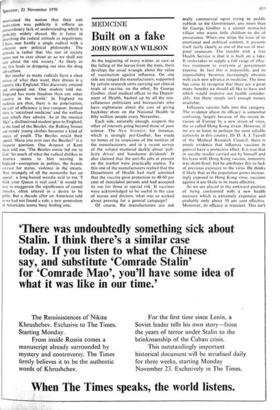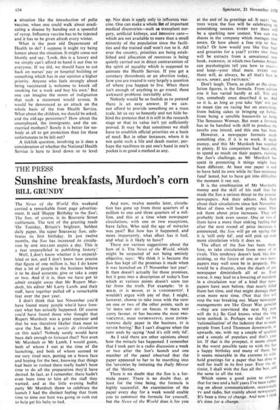MEDICINE
Built on a fake
JOHN ROWAN WILSON
At the beginning of every winter, as sure as the falling of the leaves from the trees, there develops the usual wrangle about the value of vaccination against influenza. On one side are ranged the manufacturers, supported by certain research units carrying out clinical trials of vaccine; on the other, Sir George Godber, chief medical officer to the Depart- ment of Health, backed up by all the mis- cellaneous politicians and bureaucrats who have nightmares about the cost of giving buckshee shots on the National Health to fifty million people every November.
Each side, naturally enough, suspects the other of interests going beyond those of pure science. The New Scientist, for instance, which is strongly pro-Godber, has made no bones of its suspicions of the motives of the manufacturers, and in a recent survey of the subject muttered darkly about 'pub- licity drives' and 'handsome dividends'. It also claimed that the anti-flu jabs at present on the market were practically useless. To this one of the manufacturers replied that the Department of Health had itself admitted that the vaccine gave protection to 40-60 per cent of inoculated persons and had accepted its use for those at special risk. If vaccines were acknowledged to be useful in the case of nurses and doctors, what was so wicked about pressing for a general campaign?
Of course, the manufacturers are not really commercial ogres trying to peddle rubbish to the Government, any more than Sir George Godber is a sinister monocled villain who wants little children to die of pneumonia. When one strips the issue of its emotional and political content, it presents itself fairly clearly as one of the use of mar- ginal resources. The trouble with a free Health Service is that it is built on a fake. It undertakes to supply a full range of effec- tive treatment to everyone at government expense. In fact this is impossible, and its impossibility becomes increasingly obvious with each new advance in medicine. The time has come to recognise that there are a great many benefits we should all like to have and which would improve our health consider- ably, but there simply isn't enough money available.
Influenza vaccine falls into this category. The evidence about its efficacy is somewhat confusing, largely because of the recent in- vasion of Europe by a new strain of virus, the so-called Hong Kong strain. However, if we are to listen to perhaps the most reliable authority in this country, Dr D. A. J. Tyrrell of the Medical Research Council, there is ample evidence that influenza vaccines in general have a protective effect. It is true that in specific studies carried out by himself and his team with Hong Kong vaccine, immunity was short-lived, but he attributes this to lack of previous exposure to the virus. He thinks it likely that as the population grows increas- ingly exposed to Hong Kong virus, vaccines against it are likely to be more effective.
So we are placed in the awkward position of being confronted with a new health measure which is extremely expensive and probably only about 50 per cent effective. Moreover, its efficacy is transient. This isn't situation like the introduction of polio vaccine, when one could walk about eradi- cating a disease by handing out a spoonful of syrup. Influenza vaccine has to be injected and it has to be given afresh every winter.
What is the poor old Department of Health to do? I suppose it might try being honest about the situation. It might come out bluntly and say, 'Look, this is a luxury and we simply can't afford to hand it out free to everyone. If we did, we should have to cut back on nurses' pay or hospital building or something which has in our opinion a higher priority. Anyone who feels strongly about being vaccinated is welcome to knock off smoking for a week and buy his own.' But one can imagine the storm of indignation that such a statement would arouse. It would be denounced as an attack on the whole basis of the free Health Service. What about the children, we should be asked, and the old-age pensioners? How about the unemployed, the immigrants, and the un- married mothers? Surely it is better for no- body at all to get protection than for these unfortunates to be left out?
A ticklish question, involving as it does a consideration of whether the National Health Service is here to level down or to level
up. Nor does it apply only to influenza vac. tine. One can make a whole rut of important medical discoveries—such as transplant sur- gery, artificial kidneys, and intensive care— which are not available to more than a small minority of the population since the facili- ties and the trained staff won't run to it. All over the country, priorities are being estab- lished and allocation of resources is being quietly carried out in direct contravention of the spirit of equality which is supposed to animate the Health Service. If you get a coronary thrombosis or an abortion today, how you are treated is very largely a question of where you happen to live. When there isn't enough of anything to go round, these awkward problems inevitably arise.
Nobody would be so foolish as to pretend there is an easy answer. If we can- not afford to provide something on a mass scale, let us say so honestly and not hide be- hind the pretence that it is still in the research stage or that its value isn't yet sufficiently proved. It may be that sometimes we shall have to establish official priorities on a basis of need. But in other instances, where it is not quite such a life and death matter, per- haps the readiness to put one's hand in one's. pocket is as good a method as any.















































 Previous page
Previous page